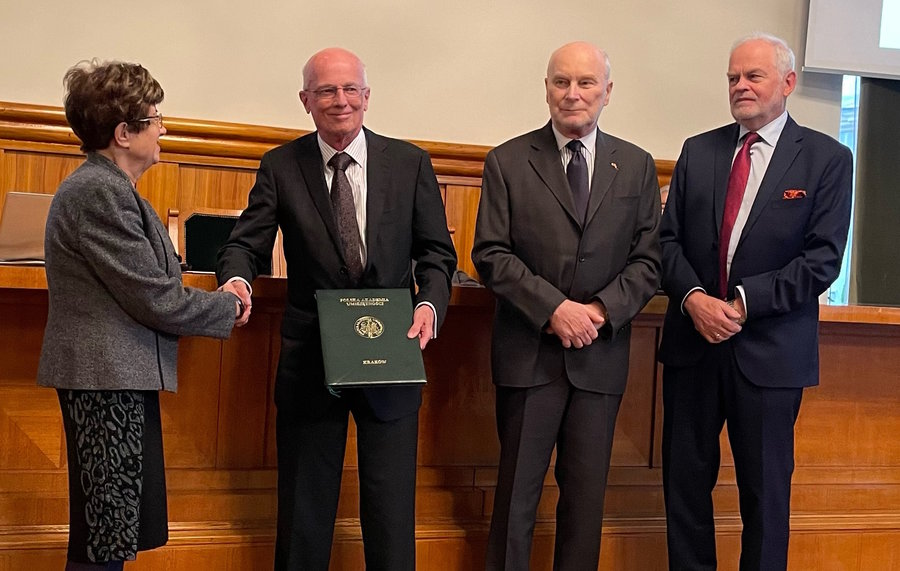Professor Peter Braun-Munzinger elected as foreign member of the Polish Academy of Arts and Sciences
27.11.2023 |
Professor Peter Braun-Munzinger, the Scientific Director of the ExtreMe Matter Institute EMMI at the GSI Helmholtzzentrum für Schwerionenforschung has been elected as foreign member of the Polish Academy of Arts and Sciences. The election recognizes his research work and his reputation on an international level.
The Polish Academy of Arts and Sciences (PAU) is the oldest academy of sciences in Poland. Active since 1872 and developing its activities on the international forum, today this association brings together more than three hundred scientists and researchers. It has its headquarters in Krakow. Membership in the PAU is considered an expression of the highest recognition for preeminent scholarly accomplishments.
“I am very honored and delighted to be accepted as a member of the Polish Academy of Arts and Sciences. The joint work will further deepen our already strong connections with Poland," said Professor Peter Braun-Munzinger. Professor Paolo Giubellino, Scientific Managing Director of GSI and FAIR, said: “I am very pleased that Professor Peter Braun-Munzinger, one of the most prominent scientists in our Institution, is receiving this recognition. Poland is one of the founding members of FAIR, they have many institutions of excellence with which we have a very fruitful partnership. The choice of Professor Braun-Munzinger will further advance our collaboration on the scientific program of the future FAIR accelerator center."
The nuclear physicist Peter Braun-Munzinger, whose work focuses primarily on ultrarelativistic heavy-ion collisions and the resulting quark-gluon plasma, was head of the ALICE department at GSI, in the period from 1996 to 2011 and also held a chair at TU Darmstadt. From the very earliest days of the project, GSI has played a leading role in the construction of ALICE — one of the largest experiments at CERN, the European Organization for Nuclear Research — and in shaping the associated scientific program of research. The prime purpose of ALICE is to investigate the quark-gluon plasma, a state of matter that existed in the first few fractions of a second after the Big Bang.
Professor Braun-Munzinger studied physics at Heidelberg University, where he was awarded a doctorate summa cum laude. As a doctoral candidate, he held a scholarship of the Studienstiftung des Deutschen Volkes, following which he worked as a postdoctoral researcher at the Max Planck Institute for Nuclear Physics in Heidelberg. In 1976, he joined the State University of New York at Stony Brook, where he became a full professor in 1982. After his return to Germany, he served as project manager for the time projection chamber of the ALICE experiment at CERN from 1998 until 2010. He was also chair of the collaboration board of ALICE from 2011 to 2016 and Helmholtz professor at GSI from 2011 to 2014. He has held an honorary chair at Heidelberg University since 2014.
In the periods from 1984 to 1987 and 2000 to 2002, Professor Braun-Munzinger was an editor of Physical Review Letters. Published by the American Physical Society, this is one of the world’s oldest and most renowned academic journals in the field of physics. Peter Braun-Munzinger’s scientific work has attracted numerous awards. In 1994, for example, he was made a fellow of the American Physical Society, and in 2011 a member of the Academia Europaea. In 2014, he was awarded the Lise Meitner Prize, in 2019 he has been awarded the Stern Gerlach Medal. (BP)













